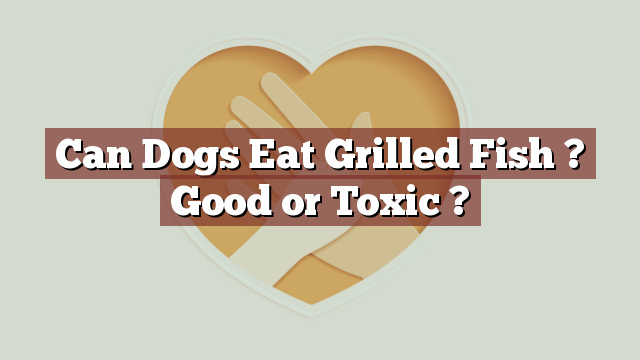Can Dogs Eat Grilled Fish? Good or Toxic?
As pet owners, it’s important to be aware of what foods are safe for our furry friends. While some human foods can be harmful to dogs, others can actually provide nutritional benefits. One common question that arises is whether dogs can safely consume grilled fish. In this article, we will explore the nutritional value of grilled fish for dogs, discuss its safety, potential risks and benefits, and provide guidance on what to do if your dog eats grilled fish.
Nutritional Value of Grilled Fish for Dogs
Grilled fish can be a great source of essential nutrients for dogs. It is rich in high-quality protein, which is essential for the growth and maintenance of their muscles. Fish also contains omega-3 fatty acids, which have been found to promote a healthy coat, reduce inflammation, and support brain function in dogs. Additionally, fish is a good source of vitamins and minerals such as vitamin D, vitamin B12, selenium, and phosphorus.
Is Grilled Fish Safe or Toxic for Dogs?
Yes, dogs can safely eat grilled fish as long as it is prepared plain without any added seasoning or spices. However, there are a few important considerations to keep in mind. First, it is crucial to remove all bones from the fish before feeding it to your dog, as bones can pose a choking hazard and may cause damage to their digestive system. Secondly, it is important to avoid feeding fish that has been cooked with garlic or onions, as these ingredients can be toxic to dogs.
Potential Risks and Benefits of Dogs Consuming Grilled Fish
While grilled fish can provide numerous health benefits to dogs, there are also potential risks associated with its consumption. One potential risk is the presence of mercury in certain types of fish. It is recommended to choose fish with lower mercury levels, such as salmon or trout, and to limit the frequency of fish consumption to avoid mercury buildup in your dog’s system. Additionally, some dogs may be allergic to fish or experience digestive issues, so it is important to monitor their reactions after consuming grilled fish.
On the other hand, the benefits of dogs consuming grilled fish include improved skin and coat health, reduced inflammation, and enhanced brain function. The omega-3 fatty acids found in fish can also support the overall well-being and immune system of your furry friend.
What to Do if Your Dog Eats Grilled Fish
If your dog accidentally consumes grilled fish, there are a few steps you can take. Firstly, check for any signs of choking or discomfort. If your dog is experiencing difficulty breathing or shows signs of distress, seek immediate veterinary attention. Secondly, if you suspect that your dog has consumed fish bones, monitor their behavior and look for any signs of discomfort, such as vomiting, diarrhea, or abdominal pain. If you notice any of these symptoms, contact your vet right away.
Conclusion: Grilled Fish Can Be a Nutritious Addition to a Dog’s Diet
In conclusion, dogs can safely eat grilled fish as long as it is boneless and free from any harmful ingredients such as garlic or onions. Grilled fish provides valuable nutrients, including protein, omega-3 fatty acids, and essential vitamins and minerals. However, it is important to be mindful of potential risks such as mercury levels and individual allergies. Always consult with your veterinarian if you have any concerns or questions regarding your dog’s diet.
Thank you for investing your time in exploring [page_title] on Can-Eat.org. Our goal is to provide readers like you with thorough and reliable information about various dietary topics. Each article, including [page_title], stems from diligent research and a passion for understanding the nuances of our food choices. We believe that knowledge is a vital step towards making informed and healthy decisions. However, while "[page_title]" sheds light on its specific topic, it's crucial to remember that everyone's body reacts differently to foods and dietary changes. What might be beneficial for one person could have different effects on another. Before you consider integrating suggestions or insights from "[page_title]" into your diet, it's always wise to consult with a nutritionist or healthcare professional. Their specialized knowledge ensures that you're making choices best suited to your individual health needs. As you navigate [page_title], be mindful of potential allergies, intolerances, or unique dietary requirements you may have. No singular article can capture the vast diversity of human health, and individualized guidance is invaluable. The content provided in [page_title] serves as a general guide. It is not, by any means, a substitute for personalized medical or nutritional advice. Your health should always be the top priority, and professional guidance is the best path forward. In your journey towards a balanced and nutritious lifestyle, we hope that [page_title] serves as a helpful stepping stone. Remember, informed decisions lead to healthier outcomes. Thank you for trusting Can-Eat.org. Continue exploring, learning, and prioritizing your health. Cheers to a well-informed and healthier future!

